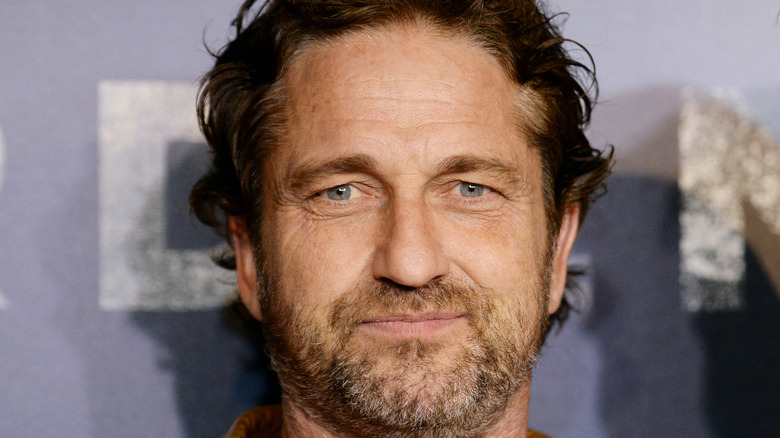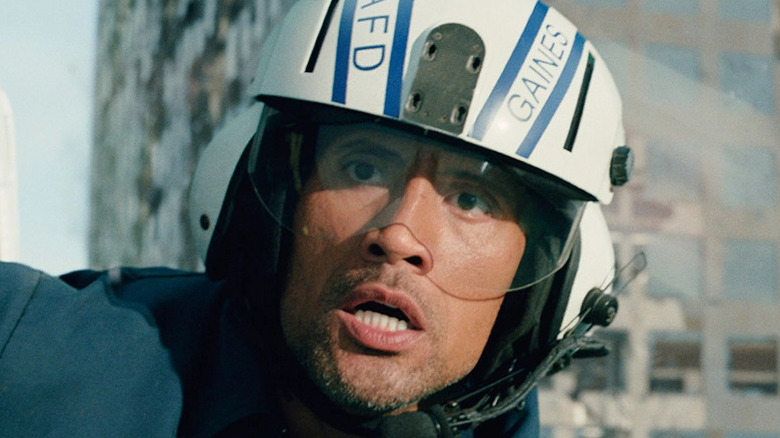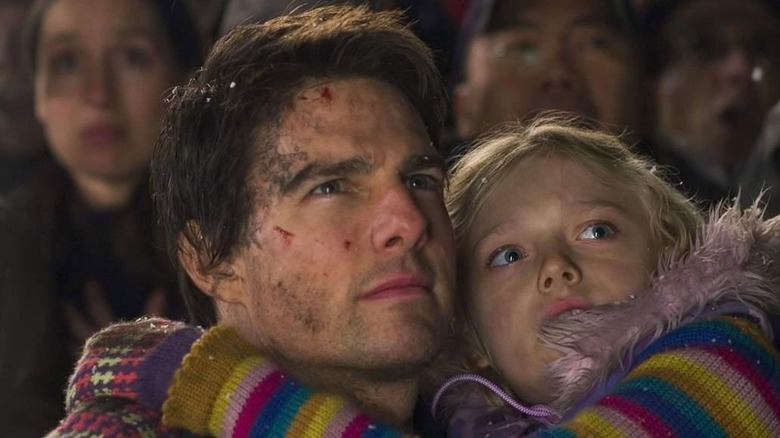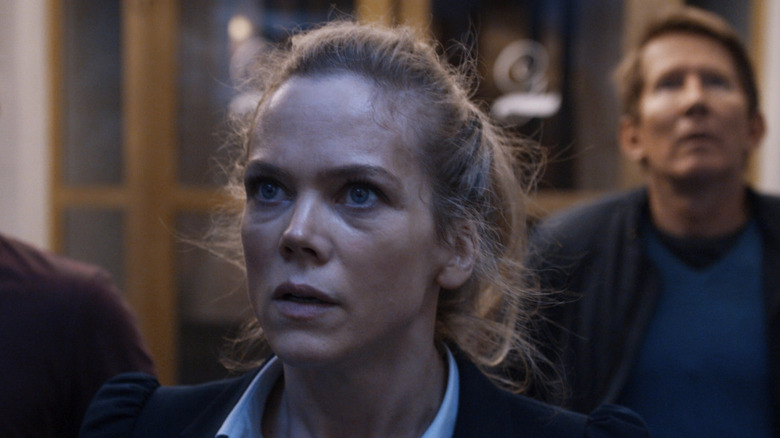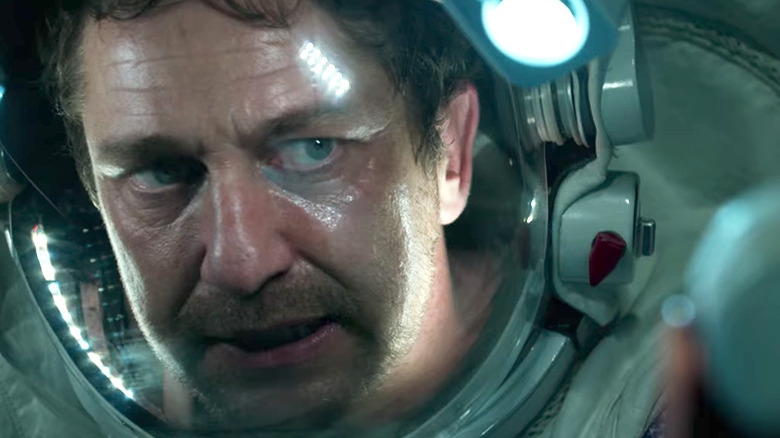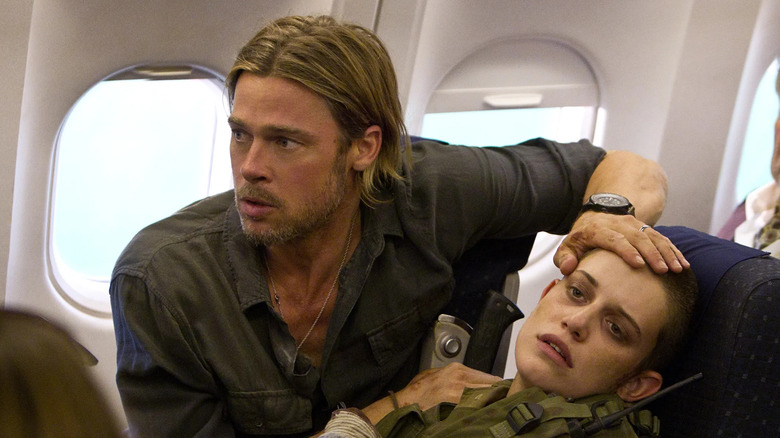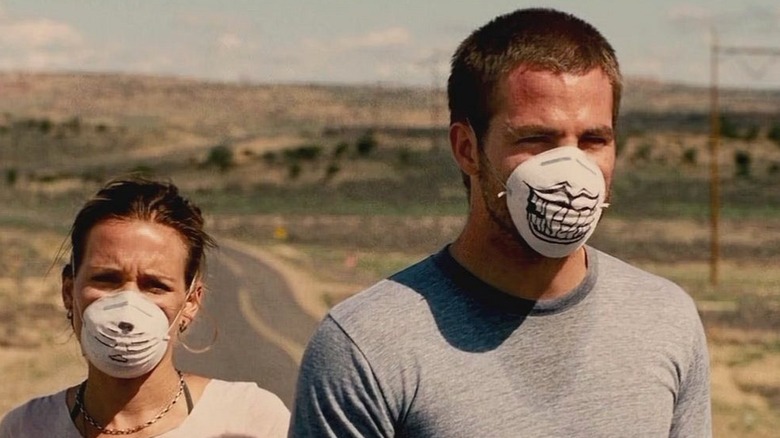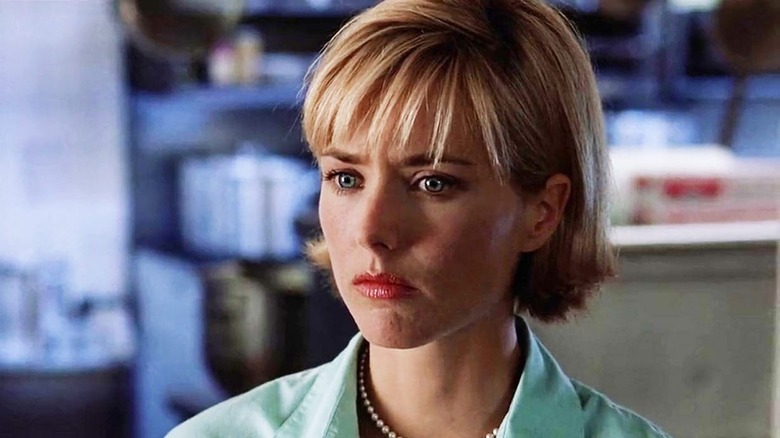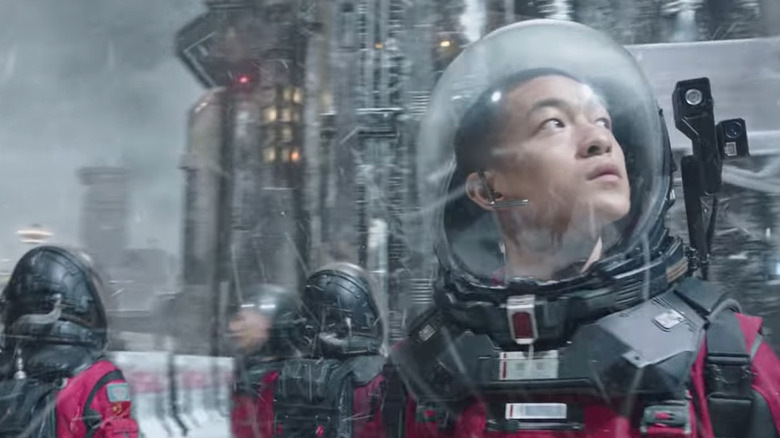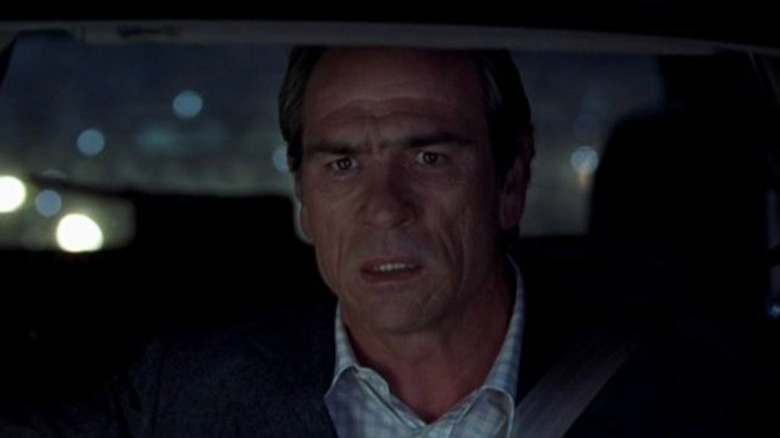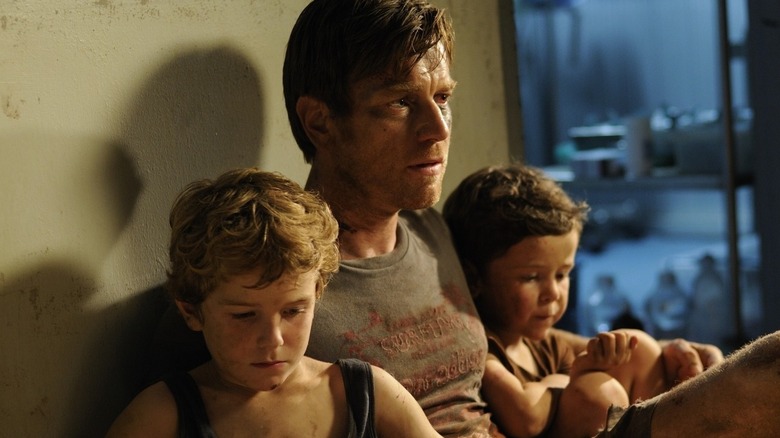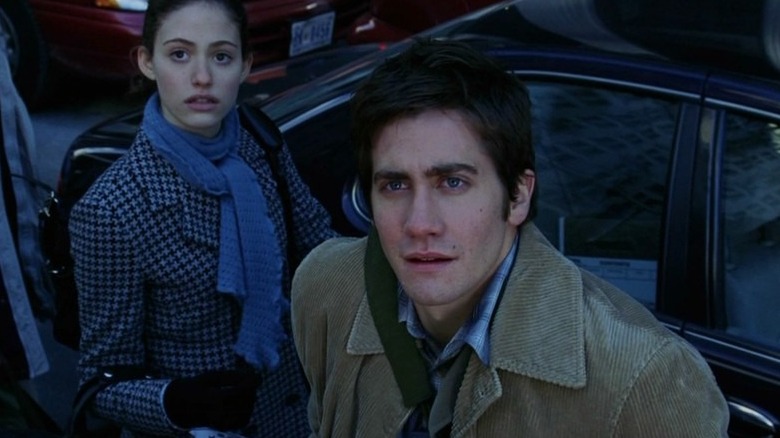Movies Like Greenland That Disaster Movie Fans Need To See
Disaster movies have a long Hollywood legacy stretching all the way back to the earliest big-screen efforts, from the 1913's "Atlantis" about the sinking of the Titanic all the way up to the 2020 Kristen Stewart movie "Underwater." The genre arguably reached its peak in the 1970s with movies like "The Poseidon Adventure" and "The Towering Inferno," but in reality, disaster movies have always been popular. Exploding volcanos, sinking ships, meteor strikes, tornados, tidal waves — an epic disaster rarely fails to satisfy audiences looking for some thrilling entertainment.
Unfortunately, thanks to their mass appeal, disaster films have gotten a bad reputation over the years thanks to poor-quality films that substitute over-the-top spectacle for a good story. And it's not without reason, as there are scores of low quality, big-budget disaster movies that opted to replace a good script with formulaic plots so they could get straight to the fireworks. But every now and then, a disaster movie comes along that surprises, with incredible performances and a compelling story. "Greenland," starring Gerard Butler, Morena Baccarin, and Scott Glenn, is the most recent — it received better reviews than most epic disaster films, and reviewers complimented it for elevating the genre.
With new disaster flicks arriving every year, it can be tough to sift through them all and separate the gems from the duds. Well, the good news is, we're here to help. Here's a list of movies like "Greenland" that disaster movie fans should see.
San Andreas
If you want a good disaster movie with a big star, you can't do much better than "San Andreas" starring Dwayne Johnson, Carla Gugino, and Alexandria Daddario. Written by Carlton Cuse — co-creator of "Lost" — the movie delivered the kind of action spectacle disaster movie fans have long dreamed of. Its scale is truly massive, with the entire state of California torn apart by a series of Earth-shattering quakes bigger than anything the world has ever seen. The Rock plays newly divorced Ray, a rescue helicopter pilot spending time with his daughter. But their visit is thrown into chaos when a break in an undetected fault line sets off a chain reaction of quakes along the San Andreas fault, destroying everything in their path.
What starts as a devastating 7.1 quickly snowballs into bigger and bigger earthquakes that wreak havoc on dams, skyscrapers, and bridges. "San Andreas" isn't just one disaster movie — it's every disaster movie rolled into one. In the midst of the destruction, Ray must save his daughter and estranged ex-wife as the world crumbles around them. Though it doesn't get high marks for originality, it's The Rock's presence at the center of the story that carries the weight that California's bedrock foundation cannot, making it one of the better disaster flicks of the last decade. In their 7.5 review of the film, IGN remarked that the movie "offers a good deal of fun, deftly straddling the line between action flick and disaster pic."
War of the Worlds
Steven Spielberg's 2005 big-budget remake of "The War of The Worlds" is based on the classic science fiction novel by H.G Wells and stars Tom Cruise, Dakota Fanning, and Justin Chatwin. The film follows a father and his two children who hope to outrun the devastation wrought by a race of horrifying alien invaders that destroy everything they encounter. Cruise plays another divorced Ray, this time a New York dock worker who gets a visit from his two kids while their mother is headed north to stay with family for the weekend. But when a race of technologically advanced aliens with massive tripod ships invade the Earth, Ray must take his kids and find a safe haven.
Their adventure takes them to New Jersey, the Hudson Ferry, and eventually Boston, meeting eccentric characters — both helpful and dangerous — along the way, all the while evading the attacking alien ships. Spielberg's incredible direction and penchant for strong storytelling helped turn what might otherwise have been another disappointing alien invasion story into a worthy update to the classic novel. The film successfully translated not just the big, explosive alien action but the very real sense of terror that Wells' book was famous for, updated with timely post-9/11 themes of fear and paranoia. The movie was well-reviewed by critics, especially Ken Tucker of New York Magazine, who hailed it as "huge and scary, moving and funny ... a summer popcorn movie that deserves a great and varied audience."
The Wave
One of the better-reviewed disaster movies of the past decade, "The Wave" is a stunning Norwegian survival film about the collapse of the Åkerneset crevice in Møre og Romsdal and the ensuing destruction wrought by the avalanche and tsunami that are created in its wake. The movie follows Kristian Eikjord (Kristoffer Jonner, who appeared in "Mission Impossible: Fallout"), a geologist in the small town of Geiranger. In classic disaster movie fashion, he sees early signs of a coming disaster event but is fatefully ignored when he tries to warn those in charge about the forthcoming danger. When the crisis does inevitably arrive — to everyone's shock but his — Eikjord desperately hopes to escape with his family in tow, as the lush Norwegian landscape is torn asunder by the incoming tsunami.
If you can handle a foreign language film, you won't be disappointed, as a series of tense action sequences and terrifying moments of destruction blanket the film. Narrow escapes and thrilling rescues — on top of tragic losses – help make it as exciting and jaw-dropping as any American disaster movie a fan could want. Though the story follows most of the same beats as other movies of its ilk, it's the focus on the characters and human drama that helped the film receive rave reviews. Notably, a four-star review in "The Guardian" praised its look at how average townspeople are affected by the cataclysmic fallout of a natural disaster.
Geostorm
It may not have elevated the genre in the same way as "Greenland," but star Gerard Butler's earlier disaster movie "Geostorm" successfully mixed the classic out-of-control storm movies like "Twister" and "Into the Storm" with the political intrigue and action thriller elements of movies like "Olympus Has Fallen" to create something fresh and exciting. The film opens in the near future where an elaborate technological solution to global warming has arisen — a complex series of low Earth orbit satellite stations that are able to keep disastrous weather events at bay and prevent devastating hurricanes and rampaging floods all across the globe. But when the satellites begin to go haywire, it's a ticking clock scenario to prevent a "Geostorm," a weather event that could wipe out entire nations, and it appears the malfunctions may not be an accident. Now it's up to the technology's chief architect Jake Lawson (Butler) to prevent a global cataclysm and uncover the person responsible for turning the world-saving satellites into world-destroying weapons.
More than just a disaster movie, it's also a suspenseful mystery and political thriller. Notably, Lawson works to uncover the terrorist plot and prevent the end of the world, with exciting sci-fi space action sequences complimenting the CGI destruction essential to any good disaster movie. Though it wasn't as highly rated as "Greenland," it's hard to deny that it's a fun and exciting adventure, and one of the most impressive-looking movies of its kind.
World War Z
Part action film, part disaster flick, part post-apocalyptic zombie movie, "World War Z" crisscrossed multiple genres, and in doing so, created something unique for audiences. Though it has been criticized for not reflecting the source material well enough to satisfy fans of the original novel, the Brad Pitt film nonetheless works well on its own merits. The zombie disaster film follows Gerry Lane, a retired field agent with the United Nations who's brought in to help with a mysterious viral outbreak that's gotten out of control and turned groups of ordinary people into throngs of mindless flesh-eaters. Along with Pitt, the flick stars Mireille Enos ("The Killing") and has a small cameo from Peter Capaldi as a WHO doctor (yes, you read that right).
As the world's militaries struggle to fight the armies of the infected and maintain order, scientists argue over how to develop a vaccine, which will require tracking down the source of the virus. From there, it's a globe-hopping adventure that takes Lane and his family from Philadelphia to Jerusalem to the United Kingdom to help find a cure while fighting hordes of walking dead along the way. "World War Z" may not have won any major awards, but from its opening scene to its final moments, the mounting tension will have you holding your breath. And with thrilling set-pieces and dramatic character moments, it's a fast-paced, action-packed, and terrifying story that is sure to keep you on the edge of your seat.
Carriers
"Carriers" was an early film starring Chris Pine that was shelved for several years until his appearance as the new Captain Kirk in J.J. Abram's 2009 "Star Trek" film. Also starring Chris Meloni, Piper Perabo, Kiernan Shipka, and Emily VanCamp, "Carriers" tells the story of a global pandemic that devastates the world's population. Surprisingly, nobody hesitates to wear face masks as the outbreak begins killing millions, and two couples hit the empty roads with hopes of reaching a Florida beach resort they believe will offer them safe haven from the virus. As society shuts down, the group drives across the barren landscape and encounters other survivors, from a group of angry, armed doomsday preppers to a father desperate to save his infected daughter.
Though it lacks the over-the-top destructive spectacle of most of the big-budget disaster movies on this list, it's the "Greenland" style journey to safety and the dark character drama that makes it more than a simple blockbuster adventure. As the foursome is forced to deal with one challenge after another, things go from bad to worse on their way to Turtle Beach. Comparisons to horror classics like "Zombieland" or "Dawn of the Dead" are inevitable, but "Carriers" is a gripping human thriller rather than a fantasy zombie adventure (there are no undead walkers here). Though it was released with little fanfare and has been mostly forgotten, it's a top-notch road survival movie with an excellent cast and was well-reviewed when it was finally seen.
Deep Impact
The mid-1990s saw a resurgence of big-budget disaster movies. And with the discovery of the widely observed and highly publicized Hale-Bopp comet in 1995 came a handful of end-of-the-world movies that capitalized on the public's growing fears of a planet-destroying asteroid. These new Hollywood epics included Michael Bay's "Armageddon" and the TV movie "Without Warning," but our favorite of the bunch was "Deep Impact." Released the same summer as the Bruce Willis action picture, it stars Téa Leoni, Morgan Freeman, Robert Duvall, and Elijah Wood. In the film, an extinction-level event is predicted when a massive comet estimated to be the size of Mount Everest is discovered to be hurtling toward Earth. With just one year to prevent mankind's total annihilation, the United States and Russia team up to send a group of astronauts into space to destroy the comet, while those on Earth prepare for the end of days should they fail.
Famous for its heart-wrenching ending, quality cast, and emotional performances, "Deep Impact" is not the bombastic roller coaster action film that "Armageddon" was. Instead, it's a poignant story about everyday people preparing for the end of the world amid a global disaster that could wipe out all life on the planet. While it didn't enjoy quite the same level of box office dollars that its bigger Michael Bay-directed cousin did, "Deep Impact" did enjoy better reviews, with Roger Ebert calling it "one of the more thoughtful disaster epics of the 1990s/2000s."
The Wandering Earth
Just when we thought we'd seen every kind of disaster movie story that could be told, just when we thought movies had run out of new ideas, something new came along in the form of "The Wandering Earth." And it wasn't a Hollywood film, but a Chinese sci-fi post-apocalyptic epic unlike anything audiences had ever seen. In fact, this uniqueness helped it earn the second-highest gross ever for a movie in the Middle Kingdom when it released in 2019. The story is set in a near-future where the sun is predicted to go nova and obliterate the planet. In "The Wandering Earth," the population engages in an unprecedented global effort to avert the cataclysm by creating a new technology — a series of city-sized rocket thrusters — that will literally propel the planet out of our solar system and into the orbit of another star.
It's a far-out premise on its face, but with a solid script, top-notch special effects, and some real heart, the film is as dramatic and intense as the best of the genre. The film was especially ambitious for its market, with a mammoth budget unheard of for a sci-fi film in China, where the genre typically doesn't play well. It received stellar reviews, with Simon Abrams of RogerEbert.com praising both its impressive special effects and for breathing "new life into hackneyed tropes." With its success critically and especially at the box office, it's no surprise that a sequel is in the works, with a planned release of 2023.
Volcano
One of two major studio volcano disaster movies released to theaters in the first half of 1997, "Volcano" is the film we're recommending as a guilty pleasure. It doesn't offer anything new and does nothing to elevate the disaster film concept, but there's still something incredibly satisfying about the flick. Whether it's the wild visuals, the incredible, award-winning cast, or just the big fun of seeing Los Angeles overtaken by a mountain of searing hot molten magma, it delivers a solidly entertaining time. We're still not sure why Hollywood felt 1997 was the year to release two oddly specific and similar disaster movies, but their duel at the box office proved that it may have been one too many, with both films struggling financially.
Starring Tommy Lee Jones — fresh off his role as "Two-Face" in the Joel Schumacher directed "Batman Forever" — "Volcano" follows Michael Roark, the director of Los Angeles' Office of Emergency Management who investigates an underground quake. Elsewhere, Amy Barnes (Anne Heche) is a city geologist who theorizes that a previously unknown volcano beneath the City of Angels is about to erupt. As expected, nobody listens, and the city is unprepared for the devastation that comes next. While "Volcano" and its twin rival — the Pierce Brosnan-led "Dante's Peak" — both have their flaws, Slashfilm ultimately concluded that the Tommy Lee Jones epic was the more enjoyable watch, even if for all the wrong reasons.
The Impossible
"The Impossible" is the only entry on this list that is based on a true story — that of the Alvarez Belon family and the real-life natural disaster that decimated a nation, ultimately claiming more than 200,000 lives in one of the most deadly disasters in modern history. The 2012 film was directed by J.A. Bayona ("Jurassic World: Fallen Kingdom") and dramatized the tsunami that devastated Thailand eight years earlier. Starring Ewan McGregor, Naomi Watts, and Tom Holland, the film focused on a U.K. family on vacation caught up in the crisis as it unfolds. The family of five is in Thailand for Christmas break when the Indian Ocean tsunami rocks the small island nation, splitting up the family and leaving the injured vacationers fighting for their lives in an effort to reach safety as flood water rise and conditions deteriorate.
The film is a harrowing true disaster story filled with excitement, action, and terror — but also emotional and inspirational moments of courage, selflessness, and determination, as the family crisscrosses the island with other survivors to find each other and make it out alive. The film is notable for being Tom Holland's big-screen debut, just three years before his casting as the MCU's "Spider-Man." He went through a rigorous production alongside Hollywood heavyweights McGregor and Watts and was 14 when it wrapped, garnering him a win for Best Male Newcomer at the Empire Awards. "The Impossible" received strong reviews, with "The Metro" calling it "a heart-wrenchingly tense survival drama."
The Day After Tomorrow
The 2004 film "The Day After Tomorrow" was a disaster movie written and directed by Rolland Emmerich that showed the end result of man-made climate change, with a series of disastrous weather events that threaten to bring about a new Earth ice age. The film had a haunting marketing campaign that showcased an iced-over Statue of Liberty up to its neck in snow and starred Jake Gyllenhaal, Dennis Quaid, Ian Holm, and Emmy Rossum. Not just a fantasy blockbuster, the film was actually based on a semi-fictional book, "The Coming Global Superstorm" by Art Bell and Whitley Strieber, meaning that while exaggerated for dramatic effect, the disasters it portends may not be as far-fetched as they might at first seem.
In the film, a paleoclimatologist named Jack Hall (Quaid) predicts the coming of a massive shift in global weather that could freeze the entire planet, but only Scottish oceanographer Terry Rapson (Ian Holm) takes him seriously. Before long, the entire world is struck by all manner of disasters, from tsunamis and hurricanes to flash freezes, floods, and earthquakes. In New York, Jack's son Sam (Gyllenhaal) and a group of survivors desperately seek refuge but struggle to stay alive as world governments take drastic measures to ensure the survival of the human race. With its message and warning of the dangers of climate change, "The Day After Tomorrow" was a social call to action, and given the alarmingly increasing rate of real-life disasters, a sequel could very well be titled "Tomorrow."
